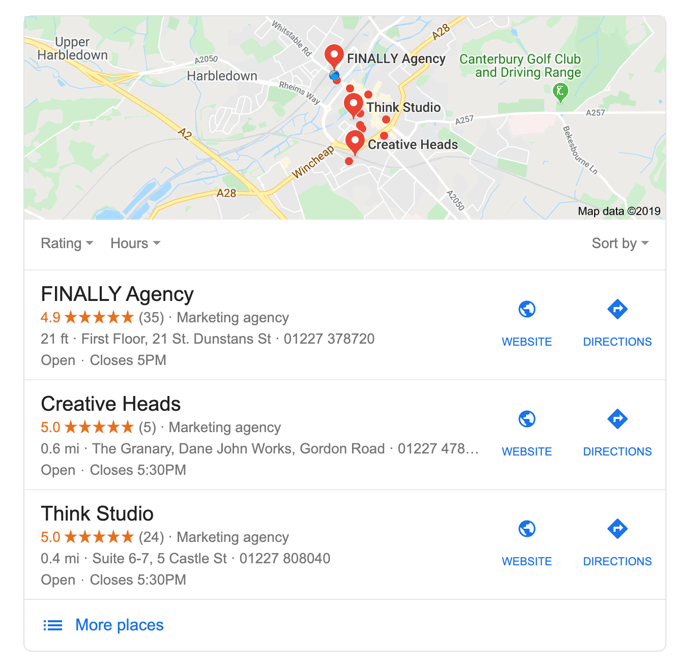What is local SEO and why is it important to your overall strategy?
For small companies, how you rank for local searches can play a crucial role in the success of your business. We're on hand with tips on how to help you to optimise for local searches, to help you capitalise on the opportunities it presents.
What is local SEO?
Ever Googled any of the following?
• Builders near me
• Indian restaurants in [your location]
• Chemists open now
• Local NHS dentists
Chances are you have – and you’d be in good company. Studies show that four out of five consumers use local searches – and the number is only to grow. There’s already been a 900% jump in these types of search terms over the past two years.
Long story short, if you’re not optimising for these local keywords, then you should be. If you need any help with this, you can plan your local SEO strategy with FINALLY.
Five fool-proof ways to optimise for local SEO
Just how your company ranks for these search terms will largely depend on your local SEO strategy. Much like your wider SEO, this will involve keywords, links, content and on-page optimisation, but with a local focus.
However, as with most things in life, not all SEO efforts are created equal, and there are some things you can do which will generate the biggest impact. The good news? On the whole, they’re things you can do yourself – and they won’t cost you a thing.
1. Claim your business
Before you do anything else, claim your business on Google My Business (and Bing Places for Business). It’s free and easy to arrange and although there’s a verification process, you can be all set up in a matter of days.
You can update everything about your business on this directory, including your name, opening hours and contact details. For extra brownie points, make the content on your listing as rich and accurate as possible – and don’t forget to assign a category for your business. Search engines rely heavily on category data.
And, if your listing makes it to Google’s revered local three-pack, you’ll really be internet famous…
2. Keep your information accurate
Providing a seamless service for your local customer-base starts with ensuring they have everything they need to reach you.
The first thing every small business should do is to check that their opening hours, address and contact details across Google’s local search landscape are consistent and correct.
Wrong or conflicting information could affect how your business appears on SERPs and confuse your customers. It’s been reported that 50% of consumers were deterred from using a local business if the contact information was out of date on their website.
If your opening hours are seasonal, make an effort to update these across all channels and bear in mind, it may take a few days for these changes to take effect.
3. Reviews are EVERYTHING
Next to your opening hours and location, reviews are what searchers look for first before deciding their next steps. So, if you’re new to Google My Business, you’ll need to build your reviews from the ground up.
One way to do this would be to reach out to former (happy) customers and ask them to leave you a review. Next, set up a process in your workflow to ensure all new customers are asked to leave a review. You can use marketing software tools such as the ones provided by HubSpot to help manage this journey.
4. Don't forget about mobile users
It’s safe to say that how your website appears on mobile can impact your overall local SEO success.
According to Google data, 50% of people who make a local search on their phone went into a physical store within one day. It’s safe to assume that if a local search is being made from a mobile phone, your lead is primed and ready to become your customer. Their custom is yours to lose – and you will unless you take a mobile-first approach to your website and its content.
Google even has a nifty feature which allows mobile users to press a call button to connect to local businesses directly. It should come as no surprise that by 2021, it’s estimated that mobile searches will influence more than $1.4 trillion in local sales.
5. Add local structured data markup
Structured data markup, or Schema markup, helps search engines to learn more about your business so they can rank your pages accordingly. As with metadata, it’s added to the code of websites to give search engines hints about the type of business that you run. Your products and services and your reviews are all useful tidbits of information to add here.
It’s estimated that less than a third of all websites use Schema markup, which presents a great opportunity for you to rank ahead of your competition. To check if yours is properly implemented, you can use Google’s Structured Data Testing Tool or arrange for us to run a full SEO audit of your website.
Will my company benefit from local SEO?
Unless your business is exclusively online, you should devote at least some of your efforts to local SEO. If you make the most of your sales from customers based in and around your location, you should make local search your priority.
On average, the most commonly searched for local businesses are:
Restaurants and cafes (56%)
Grocers (37%)
Clothing shops (34%)
Hotels and B&Bs (34%)
Medical practices and healthcare (28%)
…with hairdressers, dentists and car dealerships following closely behind.


.png?width=721&height=1083&name=Frame%20158%20(1).png)